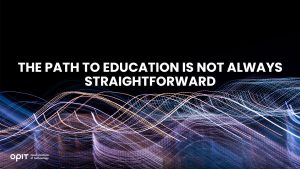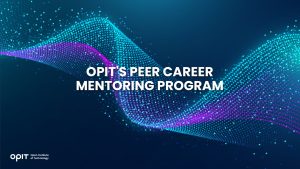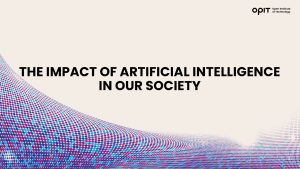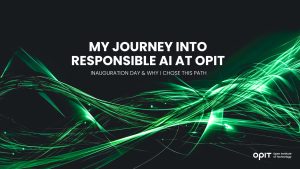Search inside The Magazine

Life is unpredictable. While many of us have specific hopes and expectations of how our futures will turn out, things don’t always go as expected. There are many variables and unexpected incidents that can interfere and force you to alter your plans, and this is particularly true when it comes to education.
For instance, you might have had plans to study a specific subject, but had to deviate from those plans due to unforeseen circumstances. Or you may have had to enter the workforce in an occupation different from the one you sought in an effort to earn an income, a move that may not provide you with the time or opportunity to achieve your desired educational aims.
In short, every individual’s career pathway is different, and very few go exactly as we expect from the outset. Fortunately, even if you experience a few false starts or sudden twists in your pathway, there are always options available to help you get back on track.
The Unpredictable Nature of Education
In theory, the educational process seems simple. You select a course of study that interests you from the vast array of subjects and prospective professions, select the appropriate classes, acquire the knowledge and skills you need to succeed, and then embark on your profession.
In reality, however, as many people know from firsthand experience, the road to education is often far from straightforward. Here are just some of the many challenges that can take your educational path in a completely different direction:
- Life’s Curveballs: As touched on in the introduction, life is impossible to predict. Financial hardships, health issues, and family emergencies are just some of the unfortunate occurrences that might derail even the most perfectly planned educational regime.
- Changing Interests: People’s desires and preferences don’t necessarily stay the same throughout their entire lives. As you grow, learn, and have new experiences, your interests may change, and so, too, may your educational objectives.
- Pressure and Burnout: Some academic paths are particularly challenging, demanding intense levels of study and hard work. This can sometimes prove too much to bear, even for the most resilient students.
- Failures and Setbacks: Conventional education largely builds around tests and examinations, requiring students to demonstrate their competencies repeatedly. It’s a system that doesn’t suit everyone, and test failures can lead to setbacks and delays.
- Inequality: People can be born with very different privileges and levels of access to education. Those in certain parts of the world may find it much more challenging to complete their education path for financial, cultural, or even political reasons.
- Late Bloomers: People develop at different paces. Some may struggle educationally early on in their lives, forcing them to make certain concessions or sacrifices related to their studies, only to find their feet later in life once they’ve entered the world of work.
Whether you’re a late bloomer, have had your educational aspirations delayed by personal problems, desire to learn new skills and try something different, or want to begin a fresh chapter in your professional life, the Open Institute of Technology (OPIT) may be able to help.
Introducing OPIT
OPIT is an online teaching platform, making high-level technological educational programs accessible to all, no matter their age or background. Offering education in fields like computer science, artificial intelligence, and digital business, OPIT provides a curated collection of degrees. In addition, they offer classes taught by world-leading tutors imparting the wisdom and skills students need to achieve their goals and become the tech leaders of tomorrow.
Meanwhile, for those who have had somewhat tumultuous or unpredictable educational paths, OPIT offers the perfect course corrector: the OPIT Foundation Year.
The OPIT Foundation Year
OPIT’s Foundation Year is a Pre-Tertiary Certificate in Information Technology, fully aligned with MQF/EQF Level 4 standards and valued at 60 ECTS credits. Lasting just one year, this program essentially serves as a comprehensive yet accessible springboard towards higher-level education, creating a path towards degrees and careers in dynamic, flexible fields, like computer science and digital business.
Like other OPIT programs, the Foundation Year is delivered entirely online via the OPIT Virtual Learning Environment. Combining live lectures, asynchronous content, and interactive assessments, students enjoy diverse and dynamic study experiences, acquiring core skills like academic writing, mathematics, and computer literacy, and building a bedrock of knowledge and confidence before taking their next steps.
Who Is the Foundation Program For?
The Foundation Program is designed to provide a solid base upon which to build the technological education many students need. It’s the perfect choice for those who are eager and ambitious to enter professions in AI, data science, and computing, but don’t feel that they have the necessary core skills and knowledge needed to dive straight into a degree.
Entry requirements are relatively relaxed in order to allow as many students as possible to enjoy the benefits of this program. With that said, applicants should ideally hold an MQF/EQF Level 3 or equivalent qualification, with the intention of pursuing a bachelor’s degree. A minimum of B2 level of English proficiency is also required, as this is the working and studying language of the institution.
What the Foundation Year Provides
Perhaps you’ve recently graduated, are considering a career change, or finally have the opportunity to return to education after initial delays or unexpected disruptions to your original plans. Either way, the Foundation Year can help you enjoy:
- Greater Self-Confidence: Foundation Year graduates gain the fundamental skills they need to enter degree programs with much more self-belief and assuredness.
- Superior Tech Knowledge: Lasting two terms, this course explores mathematics, academic reading and writing, and provides an introduction to computer hardware and software.
- Foundational Mathematics: Mathematics literacy forms a large part of the study focus for the Foundation Year, helping students feel more comfortable with numbers and formulas.
- Flexible Learning: Unlike more rigid, conventional education environments, OPIT gives you the freedom and flexibility to study at a pace that suits you best, all from the comfort of home.
- Global Community: OPIT is an international institution, with staff and students from all around the world eager to share knowledge, exchange ideas, and help one another.
Take Your Next Steps to Success With the OPIT Foundation Year
If you’re curious about a career in technology or have always wanted to work with AI, data, and computers, but struggled to find the time and opportunities you need to acquire relevant skills and knowledge, the Foundation Program was made for people like you.
It’s the ideal entry point into the exciting world of online education, and the perfect first step towards a prestigious degree from an innovative and increasingly successful institution. Download the brochure to learn more about it, or start your online application, today.

Source:
- Agenda Digitale, published on November 25th, 2025
In recent years, the word ” sustainability ” has become a firm fixture in the corporate lexicon. However, simply “doing no harm” is no longer enough: the climate crisis , social inequalities , and the erosion of natural resources require a change of pace. This is where the net-positive paradigm comes in , a model that isn’t content to simply reduce negative impacts, but aims to generate more social and environmental value than is consumed.
This isn’t about philanthropy, nor is it about reputational makeovers: net-positive is a strategic approach that intertwines economics, technology, and corporate culture. Within this framework, digitalization becomes an essential lever, capable of enabling regenerative models through circular platforms and exponential technologies.
Blockchain, AI, and IoT: The Technological Triad of Regeneration
Blockchain, Artificial Intelligence, and the Internet of Things represent the technological triad that makes this paradigm shift possible. Each addresses a critical point in regeneration.
Blockchain guarantees the traceability of material flows and product life cycles, allowing a regenerated dress or a bottle collected at sea to tell their story in a transparent and verifiable way.
Artificial Intelligence optimizes recovery and redistribution chains, predicting supply and demand, reducing waste and improving the efficiency of circular processes .
Finally, IoT enables real-time monitoring, from sensors installed at recycling plants to sharing mobility platforms, returning granular data for quick, informed decisions.
These integrated technologies allow us to move beyond linear vision and enable systems in which value is continuously regenerated.
New business models: from product-as-a-service to incentive tokens
Digital regeneration is n’t limited to the technological dimension; it’s redefining business models. More and more companies are adopting product-as-a-service approaches , transforming goods into services: from technical clothing rentals to pay-per-use for industrial machinery. This approach reduces resource consumption and encourages modular design, designed for reuse.
At the same time, circular marketplaces create ecosystems where materials, components, and products find new life. No longer waste, but input for other production processes. The logic of scarcity is overturned in an economy of regenerated abundance.
To complete the picture, incentive tokens — digital tools that reward virtuous behavior, from collecting plastic from the sea to reusing used clothing — activate global communities and catalyze private capital for regeneration.
Measuring Impact: Integrated Metrics for Net-Positiveness
One of the main obstacles to the widespread adoption of net-positive models is the difficulty of measuring their impact. Traditional profit-focused accounting systems are not enough. They need to be combined with integrated metrics that combine ESG and ROI, such as impact-weighted accounting or innovative indicators like lifetime carbon savings.
In this way, companies can validate the scalability of their models and attract investors who are increasingly attentive to financial returns that go hand in hand with social and environmental returns.
Case studies: RePlanet Energy, RIFO, and Ogyre
Concrete examples demonstrate how the combination of circular platforms and exponential technologies can generate real value. RePlanet Energy has defined its Massive Transformative Purpose as “Enabling Regeneration” and is now providing sustainable energy to Nigerian schools and hospitals, thanks in part to transparent blockchain-based supply chains and the active contribution of employees. RIFO, a Tuscan circular fashion brand, regenerates textile waste into new clothing, supporting local artisans and promoting workplace inclusion, with transparency in the production process as a distinctive feature and driver of loyalty. Ogyre incentivizes fishermen to collect plastic during their fishing trips; the recovered material is digitally tracked and transformed into new products, while the global community participates through tokens and environmental compensation programs.
These cases demonstrate how regeneration and profitability are not contradictory, but can actually feed off each other, strengthening the competitiveness of businesses.
From Net Zero to Net Positive: The Role of Massive Transformative Purpose
The crucial point lies in the distinction between sustainability and regeneration. The former aims for net zero, that is, reducing the impact until it is completely neutralized. The latter goes further, aiming for a net positive, capable of giving back more than it consumes.
This shift in perspective requires a strong Massive Transformative Purpose: an inspiring and shared goal that guides strategic choices, preventing technology from becoming a sterile end. Without this level of intentionality, even the most advanced tools risk turning into gadgets with no impact.
Regenerating business also means regenerating skills to train a new generation of professionals capable not only of using technologies but also of directing them towards regenerative business models. From this perspective, training becomes the first step in a transformation that is simultaneously cultural, economic, and social.
The Regenerative Future: Technology, Skills, and Shared Value
Digital regeneration is not an abstract concept, but a concrete practice already being tested by companies in Europe and around the world. It’s an opportunity for businesses to redefine their role, moving from mere economic operators to drivers of net-positive value for society and the environment.
The combination of blockchain, AI, and IoT with circular product-as-a-service models, marketplaces, and incentive tokens can enable scalable and sustainable regenerative ecosystems. The future of business isn’t just measured in terms of margins, but in the ability to leave the world better than we found it.

Source:
- Raconteur, published on November 06th, 2025
Many firms have conducted successful Artificial Intelligence (AI) pilot projects, but scaling them across departments and workflows remains a challenge. Inference costs, data silos, talent gaps and poor alignment with business strategy are just some of the issues that leave organisations trapped in pilot purgatory. This inability to scale successful experiments means AI’s potential for improving enterprise efficiency, decision-making and innovation isn’t fully realised. So what’s the solution?
Although it’s not a magic bullet, an AI operating model is really the foundation for scaling pilot projects up to enterprise-wide deployments. Essentially it’s a structured framework that defines how the organisation develops, deploys and governs AI. By bringing together infrastructure, data, people, and governance in a flexible and secure way, it ensures that AI delivers value at scale while remaining ethical and compliant.
“A successful AI proof-of-concept is like building a single race car that can go fast,” says Professor Yu Xiong, chair of business analytics at the UK-based Surrey Business School. “An efficient AI technology operations model, however, is the entire system – the processes, tools, and team structures – for continuously manufacturing, maintaining, and safely operating an entire fleet of cars.”
But while the importance of this framework is clear, how should enterprises establish and embed it?
“It begins with a clear strategy that defines objectives, desired outcomes, and measurable success criteria, such as model performance, bias detection, and regulatory compliance metrics,” says Professor Azadeh Haratiannezhadi, co-founder of generative AI company Taktify and professor of generative AI in cybersecurity at OPIT – the Open Institute of Technology.
Platforms, tools and MLOps pipelines that enable models to be deployed, monitored and scaled in a safe and efficient way are also essential in practical terms.
“Tools and infrastructure must also be selected with transparency, cost, and governance in mind,” says Efrain Ruh, continental chief technology officer for Europe at Digitate. “Crucially, organisations need to continuously monitor the evolving AI landscape and adapt their models to new capabilities and market offerings.”
An open approach
The most effective AI operating models are also founded on openness, interoperability and modularity. Open source platforms and tools provide greater control over data, deployment environments and costs, for example. These characteristics can help enterprises to avoid vendor lock-in, successfully align AI to business culture and values, and embed it safely into cross-department workflows.
“Modularity and platformisation…avoids building isolated ‘silos’ for each project,” explains professor Xiong. “Instead, it provides a shared, reusable ‘AI platform’ that integrates toolchains for data preparation, model training, deployment, monitoring, and retraining. This drastically improves efficiency and reduces the cost of redundant work.”
A strong data strategy is equally vital for ensuring high-quality performance and reducing bias. Ideally, the AI operating model should be cloud and LLM agnostic too.
“This allows organisations to coordinate and orchestrate AI agents from various sources, whether that’s internal or 3rd party,” says Babak Hodjat, global chief technology officer of AI at Cognizant. “The interoperability also means businesses can adopt an agile iterative process for AI projects that is guided by measuring efficiency, productivity, and quality gains, while guaranteeing trust and safety are built into all elements of design and implementation.”
A robust AI operating model should feature clear objectives for compliance, security and data privacy, as well as accountability structures. Richard Corbridge, chief information officer of Segro, advises organisations to: “Start small with well-scoped pilots that solve real pain points, then bake in repeatable patterns, data contracts, test harnesses, explainability checks and rollback plans, so learning can be scaled without multiplying risk. If you don’t codify how models are approved, deployed, monitored and retired, you won’t get past pilot purgatory.”
Of course, technology alone can’t drive successful AI adoption at scale: the right skills and culture are also essential for embedding AI across the enterprise.
“Multidisciplinary teams that combine technical expertise in AI, security, and governance with deep business knowledge create a foundation for sustainable adoption,” says Professor Haratiannezhadi. “Ongoing training ensures staff acquire advanced AI skills while understanding associated risks and responsibilities.”
Ultimately, an AI operating model is the playbook that enables an enterprise to use AI responsibly and effectively at scale. By drawing together governance, technological infrastructure, cultural change and open collaboration, it supports the shift from isolated experiments to the kind of sustainable AI capability that can drive competitive advantage.
In other words, it’s the foundation for turning ambition into reality, and finally escaping pilot purgatory for good.

The Open Institute of Technology (OPIT) is the perfect place for those looking to master the core skills and gain the fundamental knowledge they need to enter the exciting and dynamic environment of the tech industry. While OPIT’s various degrees and courses unlock the doors to numerous careers, students may not know exactly which line of work they wish to enter, or how, exactly, to take the next steps.
That’s why, as well as providing exceptional online education in fields like Responsible AI, Computer Science, and Digital Business, OPIT also offers an array of career-related services, like the Peer Career Mentoring Program. Designed to provide the expert advice and support students need, this program helps students and alumni gain inspiration and insight to map out their future careers.
Introducing the OPIT Peer Career Mentoring Program
As the name implies, OPIT’s Peer Career Mentoring Program is about connecting students and alumni with experienced peers to provide insights, guidance, and mentorship and support their next steps on both a personal and professional level.
It provides a highly supportive and empowering space in which current and former learners can receive career-related advice and guidance, harnessing the rich and varied experiences of the OPIT community to accelerate growth and development.
Meet the Mentors
Plenty of experienced, expert mentors have already signed up to play their part in the Peer Career Mentoring Program at OPIT. They include managers, analysts, researchers, and more, all ready and eager to share the benefits of their experience and their unique perspectives on the tech industry, careers in tech, and the educational experience at OPIT.
Examples include:
- Marco Lorenzi: Having graduated from the MSc in Applied Data Science and AI program at OPIT, Marco has since progressed to a role as a Prompt Engineer at RWS Group and is passionate about supporting younger learners as they take their first steps into the workforce or seek career evolution.
- Antonio Amendolagine: Antonio graduated from the OPIT MSc in Applied Data Science and AI and currently works as a Product Marketing and CRM Manager with MER MEC SpA, focusing on international B2B businesses. Like other mentors in the program, he enjoys helping students feel more confident about achieving their future aims.
- Asya Mantovani: Asya took the MSc in Responsible AI program at OPIT before taking the next steps in her career as a Software Engineer with Accenture, one of the largest IT companies in the world, and a trusted partner of the institute. With a firm belief in knowledge-sharing and mutual support, she’s eager to help students progress and succeed.
The Value of the Peer Mentoring Program
The OPIT Peer Career Mentoring Program is an invaluable source of support, inspiration, motivation, and guidance for the many students and graduates of OPIT who feel the need for a helping hand or guiding light to help them find the way or make the right decisions moving forward. It’s a program built around the sharing of wisdom, skills, and insights, designed to empower all who take part.
Every student is different. Some have very clear, fixed, and firm objectives in mind for their futures. Others may have a slightly more vague outline of where they want to go and what they want to do. Others live more in the moment, focusing purely on the here and now, but not thinking too far ahead. All of these different types of people may need guidance and support from time to time, and peer mentoring provides that.
This program is also just one of many ways in which OPIT bridges the gaps between learners around the world, creating a whole community of students and educators, linked together by their shared passions for technology and development. So, even though you may study remotely at OPIT, you never need to feel alone or isolated from your peers.
Additional Career Services Offered by OPIT
The Peer Career Mentoring Program is just one part of the larger array of career services that students enjoy at the Open Institute of Technology.
- Career Coaching and Support: Students can schedule one-to-one sessions with the institute’s experts to receive insightful feedback, flexibly customized to their exact needs and situation. They can request resume audits, hone their interview skills, and develop action plans for the future, all with the help of experienced, expert coaches.
- Resource Hub: Maybe you need help differentiating between various career paths, or seeing where your degree might take you. Or you need a bit of assistance in handling the challenges of the job-hunting process. Either way, the OPIT Resource Hub contains the in-depth guides you need to get ahead and gain practical skills to confidently move forward.
- Career Events: Regularly, OPIT hosts online career event sessions with industry experts and leaders as guest speakers about the topics that most interest today’s tech students and graduates. You can join workshops to sharpen your skills and become a better prospect in the job market, or just listen to the lessons and insights of the pros.
- Internship Opportunities: There are few better ways to begin your professional journey than an internship at a top-tier company. OPIT unlocks the doors to numerous internship roles with trusted institute partners, as well as additional professional and project opportunities where you can get hands-on work experience at a high level.
In addition to the above, OPIT also teams up with an array of leading organizations around the world, including some of the biggest names, including AWS, Accenture, and Hype. Through this network of trust, OPIT facilitates students’ steps into the world of work.
Start Your Study Journey Today
As well as the Peer Career Mentoring Program, OPIT provides numerous other exciting advantages for those who enroll, including progressive assessments, round-the-clock support, affordable rates, and a team of international professors from top universities with real-world experience in technology. In short, it’s the perfect place to push forward and get the knowledge you need to succeed.
So, if you’re eager to become a tech leader of tomorrow, learn more about OPIT today.

The world has entered the age of artificial intelligence (AI), and this exciting new technology is already changing the face of society in an ever-growing number of ways. It’s influencing a plethora of industries and sectors, from healthcare and education to finance and urban planning. This guide explores AI’s impact on three of the core pillars of life: business, education, and sustainability.
AI in Business: Unlocking Unprecedented Opportunities
In the world of business, the number of uses of AI is growing by the day. Whether it’s in sales, marketing, customer relations, operational optimization, cybersecurity, data management, or some other aspect of organizational life, there are so many ways this technology can unlock new opportunities or expedite existing processes.
Take data as an example. Many businesses now collect and use large amounts of data to inform their decisions in areas like product development or marketing strategy. But they have, up to now, been limited in how they can structure, visualize, and analyze their data. AI changes all that, as it can dig into vast databases with ease, extracting insights to drive actionable decisions in no time.
AI also bridges gaps in communications. It has the power to speak in most major languages, translating audio or written text with astonishing accuracy in an instant. In a globalized world, where many businesses buy and sell with partners, suppliers, investors, and other stakeholders from other nations, AI can help them communicate and exchange information more easily and reliably.
AI in Education: Democratizing and Accelerating the Learning Process
In the educational sector, AI is solving problems that have plagued this industry for generations and transforming the ways in which students learn and teachers teach. It can be used, for example, to personalize a student’s learning plan or adapt content to align with each learner’s favored learning style, making it easier for them to soak up and retain information and skills.
AI’s generative capabilities are also proving useful in the education sector. Teachers, for example, can turn to generative AI models to create lesson plans or supplementary content to support their courses, such as tables, charts, infographics, and images. This all helps to make the learning experience more diverse, dynamic, and engaging for every kind of learner.
On a broader level, there’s clear potential for AI to democratize education across the globe, making learning more accessible to all. That includes those in developing nations who may normally lack opportunities to gain knowledge and skills to achieve their ambitions. If harnessed correctly and responsibly, this technology could elevate education to whole new heights.
AI in Sustainability: Smarter Cities and Next-Level Efficiency
Sustainability is one of the sticking points when talking about AI, as many critics of the technology point to the fact that it involves huge amounts of energy and relies heavily on large and costly data centers to operate. At the same time, AI could also solve many of the sustainability crises facing the world today, uncovering solutions and innovations that may have previously taken decades to develop.
It’s already proving its value in this domain. For instance, DeepMind developed an AI system that was actually able to optimize data center energy efficiency, cutting the amount of energy used to cool data center hardware by a whopping 40% and improving energy efficiency in certain centers by 15%. That’s just one example, and it’s only the start of what AI could do from an environmental perspective.
This tech is also making cities smarter, more efficient, and more pleasant in which to live through AI-powered navigation aids or traffic redistribution systems. It also holds potential for future urban planning, city development, and infrastructure construction, provided the correct systems and frameworks can be established to make the best use of AI’s advantages.
The Ethical Challenges and Risks of AI
Despite its almost countless advantages and possible applications, AI is not without its flaws. This technology brings challenges and risks to go along with its opportunities, and five leading examples include:
- Bias: Algorithmic bias is an issue that has already presented itself during the relatively brief existence of AI so far. Some systems, for example, have issued responses or generated content that could be classified as discriminatory or prejudiced, due to the training data they were given.
- Privacy: There are fears among populations and analysts about the amount of data being fed into AI systems and how such data could be misused, potentially violating people’s rights of privacy and falling foul of data privacy regulations, such as GDPR.
- Misuse: Like so many game-changing technologies, AI has the potential to be used for both benevolent and malicious purposes. It may be used to spread misinformation and “fake news,” influence public opinion, or even in cyber-attacks, for instance.
- Over-reliance: AI is so powerful, with the capacity to carry out tasks with remarkable precision and speed, that it will be tempting for organizations to integrate it into many of their workflows and decision-making processes. But AI cannot be treated as a substitute for human judgment.
- Sustainability: There are also fears about the energy costs associated with AI and the data centers needed to power it, plus the fact that some elements of the burgeoning AI industry may exploit workers in poorer nations worldwide.
Solving These Challenges: Regulation and Responsible Use of AI
With the right approach, it is possible to solve all the above challenges, and more, making AI the most valuable and beneficial new technology the world has seen since the advent of the internet. This will require a two-pronged strategy focusing on both regulation and responsible usage.
Europe is already leading the way in the first aspect. It has introduced the AI Act – a world-first regulatory framework related to artificial intelligence, laying out how it should be used to drive innovation without infringing on the fundamental rights of workers and the larger public.
Educational institutions like the OPIT – Open Institute of Technology are also leading the way in the second aspect, educating people around the world on how to work with AI in a responsible, ethical way, through programs like the MSc in Responsible Artificial Intelligence.
By establishing rules and regulations about AI’s usage and educating the tech leaders of tomorrow in how to work with AI in a fair and responsible way, the future is bright for this exciting and extraordinary new technology.

On September 8, 2025, the Open Institute of Technology (OPIT) officially inaugurated its 2025/26 academic year, welcoming a whole host of new students into the institute, ready to gain the skills and knowledge they need to be the tech industry leaders of tomorrow.
Faculty members, guest speakers from around the world, and hundreds of students from over 100 nations were all in attendance at the online inauguration event. Among them was one new student on the MSc in Responsible AI program: Rem Lampa, also known by his online alias, Kuya Dev.
A Filipino podcaster, speaker, and developer, Kuya Dev documented the inauguration experience in a YouTube video, sharing his thoughts on the event. Here’s a detailed look at his experience, showing the welcoming and effective way in which new OPIT students are brought into the institute from the first day.
An Overview of the Inauguration Event
The latest OPIT inauguration event was one to remember, with the institute celebrating several notable milestones. These included the first graduation of the MSc in Applied Data Science and AI program, and the unveiling of new industry connections and corporate partners offering opportunities for graduates.
Various guest speakers were in attendance, including the former Italian Minister of Education and current OPIT Rector, Professor Francesco Profumo, plus the CEO of Malta’s accreditation authority MFHEA, Dr. Rose Anne Cuschieri.
OPIT founder, Riccardo Ocleppo, also took to the stage to highlight the transformative role of education and the unique possibilities offered by the online-only OPIT degrees, stating:
“When we launched OPIT in 2022, we wanted to prove that an online degree could be rigorous, international, deeply connected to the world of work, and engaging. Three years later, we can already see results. This year alone, 300 new students are joining us, representing 98 nationalities.”
Those hundreds of new students were also, naturally, in attendance for their big inauguration day, welcomed into the institute’s various BSc and MSc programs in specialties like Computer Science, Digital Business, Digital Business and Innovation, and Cybersecurity.
Introducing Rem ‘Kuya Dev’ Lampa
As mentioned, one of the new students joining was vlogger and podcaster, Kuya Dev.
Already boasting extensive experience and technical expertise in the computing world, Kuya Dev has founded several tech communities, including Tech Career Shifter Philippines and Server-Side JavaScript.
He describes himself as an advocate for responsible AI and tech practices, and once gave a powerful TEDx talk about the negative potential impacts of artificial intelligence (AI), including its large carbon footprint and involving exploitation of workers in emerging nations. So, it was only fitting that he signed up for OPIT’s MSc in Responsible AI.
The MSc in Responsible AI Program
A postgraduate program lasting three or four terms (between 12 and 24 months, total), OPIT’s MSc in Responsible AI is an accredited program that combines technical skills with a core focus on the ethical implications of AI technology.
It explores real-world use cases of AI and ways in which this exciting and powerful technology can be used responsibly and sustainably, emphasizing its potential for both positive and negative change in areas such as the environment and society as a whole.
Students of this program enjoy all the usual benefits that come with studying at OPIT, like flexible-paced learning, tutors available on a daily basis, a dynamic and engaging online learning environment, and fair, progressive assessments over time.
Those who graduate can move into careers in AI Application Development, AI Research, and AI Business Consulting.
Highlights and Impressions of Kuya Dev’s Inauguration Experience
Inauguration is always a special moment in any student’s academic journey as they take their first tentative yet exciting steps towards new knowledge and skills that can unlock their potential and accelerate their development.
It can even be a “make-or-break” moment in which students can either feel welcomed, empowered, and eager to begin their studies, or, conversely, experience feelings of worry, doubt, or regret if the inauguration lacks the spark they were hoping to feel.
Fortunately, Kuya Dev and his many fellow new OPIT students had a very positive experience at the inauguration event, with the vlogger calling it both “very fruitful” and “very insightful.” Some of the specific highlights he mentioned included:
An International Community
Early in the inauguration event, Kuya Dev heard from Professor Francesco Profumo about how OPIT was welcoming students from over 90 countries.
This, for Kuya Dev and for so many other students, is one of the big perks of studying with OPIT. It allows students to meet, engage, and exchange with people from dozens of different backgrounds, cultures, and communities, learning new ways of thinking and collaborating.
Real World Applications
The OPIT inauguration also focused on another of the university’s key features: a focus not merely on imparting knowledge to students or making them memorize facts, figures, and theorems, but actually teaching them how to apply that knowledge and ideas to real-world uses.
Kuya Dev commented on how other universities that he had considered attending appeared more conventional and limited in their approach, and also shared his excitement and enthusiasm at OPIT’s unique approach, focusing more on genuine industry collaboration and real-life scenarios.
Inspiring Speakers
The vlogger and podcaster also commented on the various key speakers who hosted the event. He was pleased to see that they were not only academically oriented but also all had real-world experience and a diverse range of working backgrounds in fields like politics.
This, too, is part of what makes OPIT different. It features a winning team of international tutors, professors, and experts from diverse fields, including the aforementioned former Italian Education Minister, education executives, research chairs, digital content creation specialists, and more.
Graduate Experiences
Finally, Kuya Dev noted how several OPIT graduates spoke to those about to follow the same path they did, including students from nations as diverse as the U.S., Italy, and Nigeria.
They all shared their experiences and detailed what they enjoyed most about studying with OPIT, including key factors such as professors who took the time to get to know their students, as well as the depth of the topics and knowledge covered in each course.
A Successful First Step Into OPIT Education
All in all, the recent inauguration event was a major success for all involved, giving students like Kuya Dev the ideal introduction to life and study with OPIT. He, like so many of his new fellow students, left the event eager and excited to expand their knowledge and broaden their horizons in unique ways that only OPIT can provide.

Source:
- Metro, published on October 09th, 2025
After ChatGPT came on the scene in 2022, the tech industry quickly began comparing the arrival of AI to the dawn of the internet in the 1990s.
Back then, dot-com whizzes were minting easy millions only for the bubble to burst in 2000 when interest rates were hiked. Investors sold off their holdings, companies went bust and people lost their jobs.
Now central bank officials are worried that the AI industry may see a similar boom and bust.
A record of the Financial Policy Committee’s October 2 meeting shows officials saying financial market evaluations of AI ‘appear stretched’.
‘This, when combined with increasing concentration within market indices, leaves equity markets particularly exposed should expectations around the impact of AI become less optimistic,’ they added.
AI-focused stocks are mainly in US markets but as so many investors across the world have bought into it, a fallout would be felt globally.
ChatGPT creator OpenAI, chip-maker Nvidia and cloud service firm Oracle are among the AI poster companies being priced big this year.
Earnings are ‘comparable to the peak of the dot-com bubble’, committee members said.
Factors like limited resources – think power-hungry data centres, utilities and software that companies are spending billions on – and the unpredictability of the world’s politics could lead to a drop in stock prices, called a ‘correction’.
In other words, the committee said, investors may be ignoring how risky AI technology is.
Metro spoke with nearly a dozen financial analysts, AI experts and stock researchers about whether AI will suffer a similar fate. There were mixed feelings.
‘Every bubble starts with a story people want to believe,’ says Dat Ngo, of the trading guide, Vetted Prop Firms.
‘In the late 90s, it was the internet. Today, it’s artificial intelligence. The parallels are hard to ignore: skyrocketing stock prices, endless hype and companies investing billions before fully proving their business models.
‘The Bank of England’s warning isn’t alarmist – it’s realistic. When too much capital chases the same dream, expectations outpace results and corrections follow.’
Dr Alessia Paccagnini, an associate Professor from the University College Dublin’s Michael Smurfit Graduate Business School, says that companies are spending £300billion annually on AI infrastructure, while shoppers are spending $12billion. That’s a big difference.
Tech firms listed in the US now represent 30% of New York’s stock index, S&P 500 Index, the highest proportion in 50 years.
‘As a worst-case scenario, if the bubble does burst, the immediate consequences would be severe – a sharp market correction could wipe trillions from stock valuations, hitting retirement accounts and pension funds hard,’ Dr Paccagnini adds.
‘In my opinion, we should be worried, but being prepared could help us avoid the worst outcomes.’
One reason a correction would be so bad is because of how tangled-up the AI world is, says George Sweeney, an investing expert at the personal finance website site Finder.
‘If it fails to meet the lofty expectations, we could see an almighty unravelling of the AI hype that spooks markets, leading to a serious correction,’ he says.
Despite scepticism, AI feels like it’s everywhere these days, from dog bowls and fridges to toothbrushes and bird feeders.
And it might continue that way for a while, even if not as enthusiastically as before, says Professor Filip Bialy, who specialises in computer science and AI ethics at the at Open Institute of Technology.
‘TAI hype – an overly optimistic view of the technological and economic potential of the current paradigm of AI – contributes to the growth of the bubble,’ he says.
‘However, the hype may end not with the burst of the bubble but rather with a more mature understanding of the technology.’
Some stock researchers worry that the AI boom could lose steam when the companies spending billions on the tech see profits dip.
The AI analytic company Qlik found that only one in 10 business say their AI initiatives are seeing sizeable returns.
Qlik’s chief strategy officer, James Fisher, says this doesn’t show that the hype for AI is bursting, ‘but how businesses look at AI is changing’.

OPIT – Open Institute of Technology offers an innovative and exciting way to learn about technology. It offers a range of bachelor’s and master’s programs, plus a Foundation Year program for those taking the first steps towards higher education. Through its blend of instruction-based and independent learning, it empowers ambitious minds with the skills and knowledge needed to succeed.
This guide covers all you need to know to join OPIT and start your educational journey.
Introducing the Open Institute of Technology
Before we dig into the nitty-gritty of the OPIT application process, here’s a brief introduction to OPIT.
OPIT is a fully accredited Higher Education Institution under the European Qualification Framework (EQF) and the MFHEA Authority. It offers exclusively online education in English to an international community of students. With a winning team of top professors and a specific focus on computer science, it trains the technology leaders of tomorrow.
Some of the unique elements that characterize OPIT’s approach include:
- No final exams. Instead, students undergo progressive assessments over time
- A job-oriented, practical focus on the courses
- 24/7 support, including AI assistance and student communities, so everyone feels supported
- A strong network of company connections, unlocking doors for graduates
Reasons to Join OPIT
There are many reasons for ambitious students and aspiring tech professionals to study with OPIT.
Firstly, since all the study takes place online, it’s a very flexible and pleasant way to learn. Students don’t feel the usual pressures or suffer the same constraints they would at a physical college or university. They can attend from anywhere, including their own homes, and study at a pace that suits them.
OPIT is also a specialist in the technology field. It only offers courses focused on tech and computer science, with a team of professors and tutors who lead the way in these topics. This ensures that students get high-caliber learning opportunities in this specific sector.
Learning at OPIT is also hands-on and applicable to real-world situations, despite taking place online. Students are not just taught core skills and knowledge, but are also shown how to apply those skills and knowledge in their future careers.
In addition, OPIT strives to make technology education as accessible, inclusive, and affordable as possible. Entry requirements are relatively relaxed, fees are fair, and students from around the world are welcome here.
What You Need to Know About Joining OPIT
Now you know why it’s worth joining OPIT, let’s take a closer look at how to go about it. The following sections will cover how to apply to OPIT, entry requirements, and fees.
The OPIT Application Process
Unsurprisingly for an online-only institution, the application process for OPIT is all online, too. Users can submit the relevant documents and information on their computers from the comfort of their homes.
- Visit the official OPIT site and click the “Apply now” button to get started, filling out the relevant forms.
- Upload your supporting documents. These can include your CV, as well as certificates to prove your past educational accomplishments and level of English.
- Take part in an interview. This should last no more than 30 minutes. It’s a chance for you to talk about your ambitions and background, and to ask questions you might have about OPIT.
That’s it. Once you complete the above steps, you will be admitted to your chosen course and can start enjoying OPIT education once the first term begins. You’ll need to sign your admissions contract and pay the relevant fees, then begin classes.
Entry Requirements for OPIT Courses
OPIT offers a small curated collection of courses, each with its own requirements. You can consult the relevant pages on the official OPIT site to find out the exact details.
For the Foundation Program, for example, you simply need an MQF/EQF Level 3 or equivalent qualification. You also need to demonstrate a minimum B2 level of English comprehension.
For the BSc in Digital Business, applicants should have a higher secondary school leaving certificate, plus B2-level English comprehension. You can also support your application with a credit transfer from previous studies or relevant work experience.
Overall, the requirements are simple, and it’s most important for applicants to be ambitious and eager to build successful careers in the world of technology. Those who are driven and committed will get the best from OPIT’s instruction.
Fees and Flexible Payments at OPIT
As mentioned above, OPIT makes technological education accessible and affordable for all. Its tuition fees cover all relevant teaching materials, and there are no hidden costs or extras. The institute also offers flexible payment options for those with different budgets.
Again, exact fees vary depending on which course you want to take, so it’s important to consult the specific info for each one. You can pay in advance to enjoy 10% off the final cost, or refer a friend to also obtain a discount.
In addition to this, OPIT offers need-based and merit-based scholarships. Successful candidates can obtain discounts of up to 40% on bachelor’s and master’s tuition fees. This can substantially bring the term cost of each program down, making OPIT education even more accessible.
Credit Transfers and Experience
Those who are entering OPIT with pre-existing work experience or relevant academic achievements can benefit from the credit transfer program. This allows you to potentially skip certain modules or even entire semesters if you already have relevant experience in those fields.
OPIT is flexible and fair in terms of recognizing prior learning. So, as long as you can prove your credentials and experience, this could be a beneficial option for you. The easiest way to find out more and get started is to email the OPIT team directly.
Join OPIT Today
Overall, the process to join OPIT is designed to be as easy and stress-free as possible. Everything from the initial application forms to the interview and admission process is straightforward. Requirements and fees are flexible, so people in different situations and from different backgrounds can get the education they want. Reach out to OPIT today to take your first steps to tech success.
Have questions?
Visit our FAQ page or get in touch with us!
Write us at +39 335 576 0263
Get in touch at hello@opit.com
Talk to one of our Study Advisors
We are international
We can speak in:
